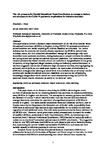The role pressures for Special Educational Needs Coordinators as managers, leaders and advocates in the Covid-19 pandemic: implications for inclusive education
| dc.contributor.author | Done, Elizabeth | |
| dc.date.accessioned | 2022-11-21T07:53:04Z | |
| dc.date.issued | 2022-11-28 | |
| dc.identifier.issn | 2375-1924 | |
| dc.identifier.issn | 2375-1924 | |
| dc.identifier.uri | http://hdl.handle.net/10026.1/19993 | |
| dc.description.abstract |
This paper aims to provide a literature-based consideration of the role of the Special Needs Educational Coordinator (SENCo) in England during COVID-19 pandemic conditions of school lockdown and partial reopening for children classified as vulnerable. The review indicates that the pressures and tensions already experienced by SENCos (around time, workload, status, and their prescribed dichotomised managerial and strategic role) were intensified under pandemic conditions, risking inadequate or delayed provision for children and young people with special educational needs and disabilities. The review also considers research prompted by related concerns around the exclusion or marginalisation of this group of students, through legal and illegal practices, during and following national lockdown. It had been suggested that the risk of exclusion might increase at this time, thus highlighting the advocacy role of SENCos, and small-scale research did report a lack of involvement of SENCos in strategic crisis planning at school level. It is concluded that an advocacy role for students with special educational needs and disabilities who were at risk of becoming increasingly marginalised within school and wider communities during the COVID-19 pandemic should now be considered as central to the SENCos’ remit. | |
| dc.language.iso | en | |
| dc.publisher | Knowledge Enterprise Journals | |
| dc.subject | Pediatric | |
| dc.title | The role pressures for Special Educational Needs Coordinators as managers, leaders and advocates in the Covid-19 pandemic: implications for inclusive education | |
| dc.type | journal-article | |
| plymouth.issue | 11 | |
| plymouth.volume | 10 | |
| plymouth.publication-status | Published | |
| plymouth.journal | Medical Research Archives | |
| dc.identifier.doi | 10.18103/mra.v10i11.3395 | |
| plymouth.organisational-group | /Plymouth | |
| plymouth.organisational-group | /Plymouth/Faculty of Arts, Humanities and Business | |
| plymouth.organisational-group | /Plymouth/Faculty of Arts, Humanities and Business/Plymouth Institute of Education | |
| plymouth.organisational-group | /Plymouth/REF 2021 Researchers by UoA | |
| plymouth.organisational-group | /Plymouth/REF 2021 Researchers by UoA/UoA23 Education | |
| plymouth.organisational-group | /Plymouth/Users by role | |
| plymouth.organisational-group | /Plymouth/Users by role/Academics | |
| dcterms.dateAccepted | 2022-11-17 | |
| dc.rights.embargodate | 2022-12-22 | |
| dc.identifier.eissn | 2375-1924 | |
| rioxxterms.versionofrecord | 10.18103/mra.v10i11.3395 | |
| rioxxterms.licenseref.uri | http://www.rioxx.net/licenses/all-rights-reserved | |
| rioxxterms.type | Journal Article/Review |


